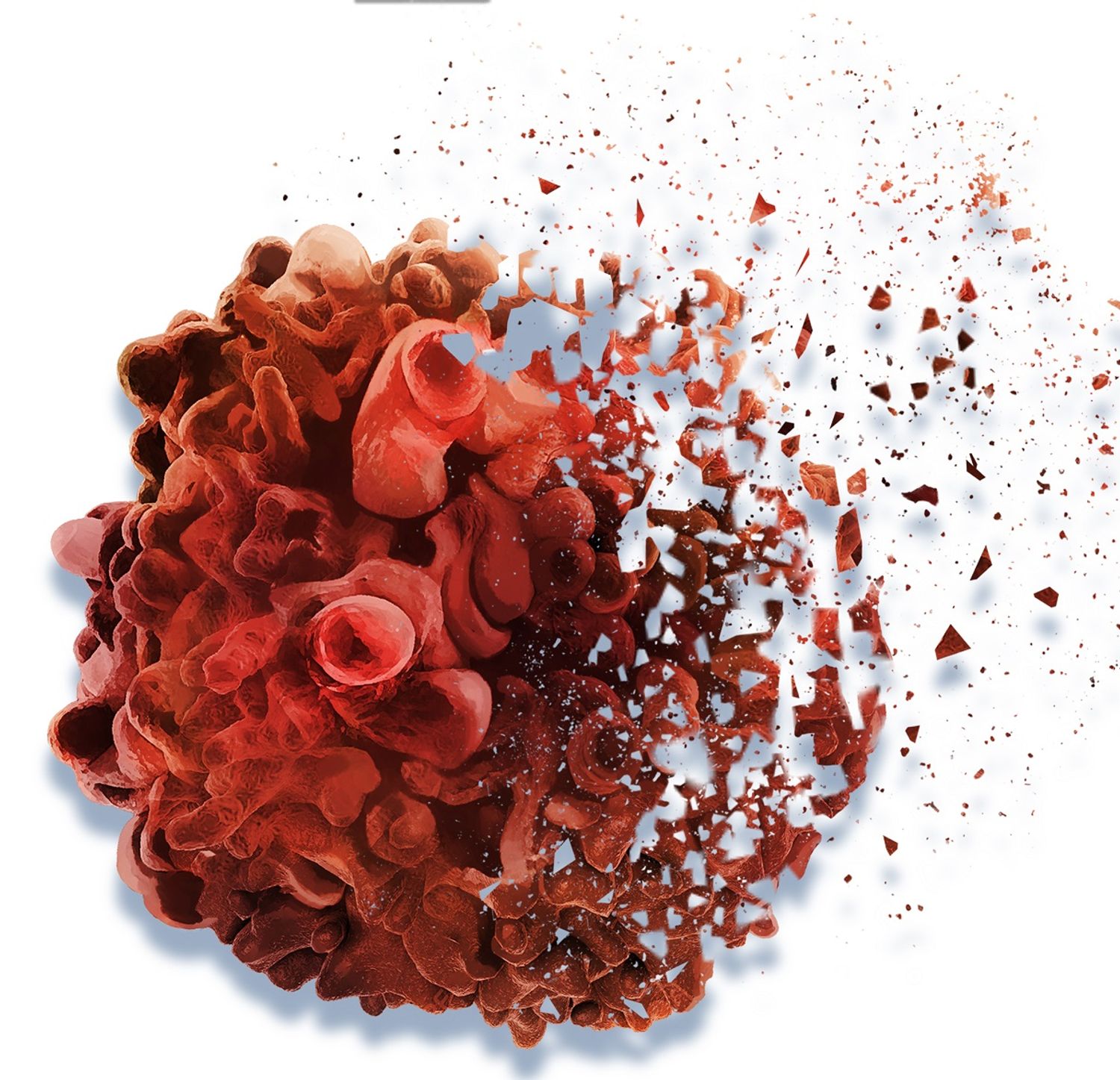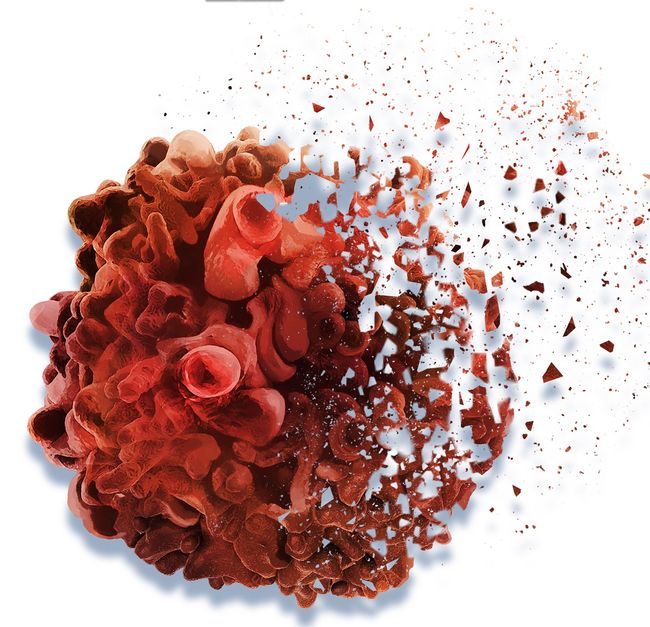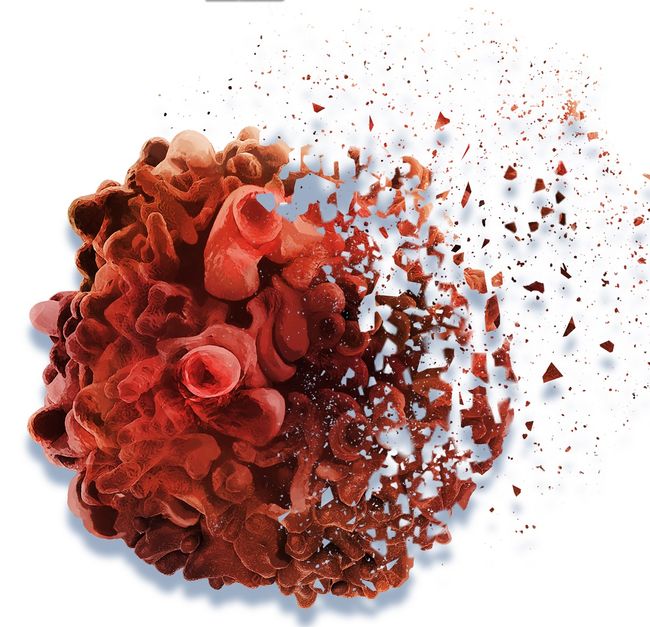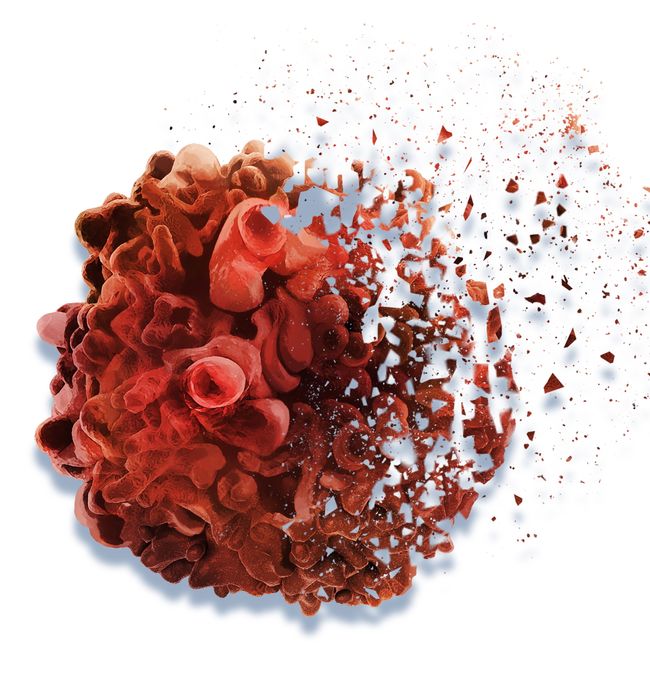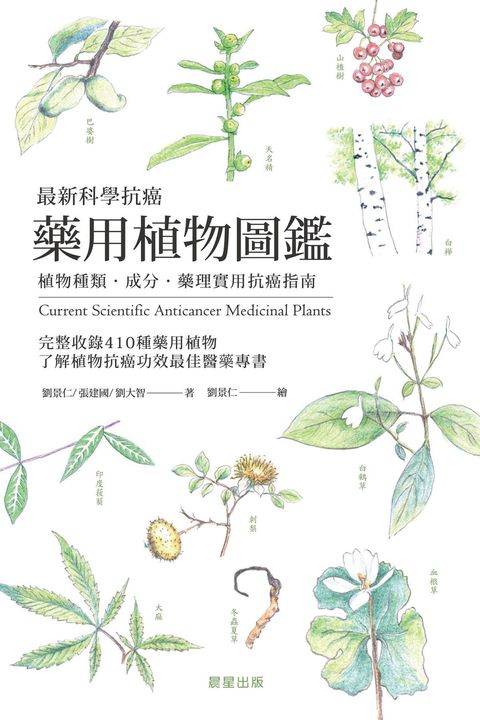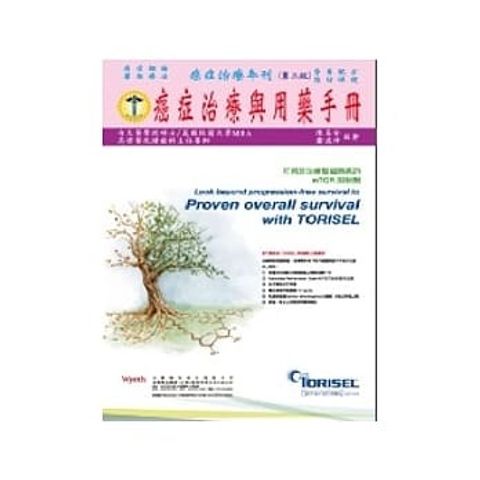The best solution for cancer cells.
Apoptosis vs Cancer cells.
Apoptosis vs Mutant cells.
Apoptosis vs Abnormal cells | Overview / Summary / Mechanism of apoptosis
What is apoptosis? | Abstract / Summary / Overview of Apoptosis
Why do cells undergo apoptosis?
The relationship between Abnormal cells and apoptosis
Where are the weaknesses and symptoms of Abnormal cells?
What is apoptosis ? | Abstract / Summary / Overview of Apoptosis
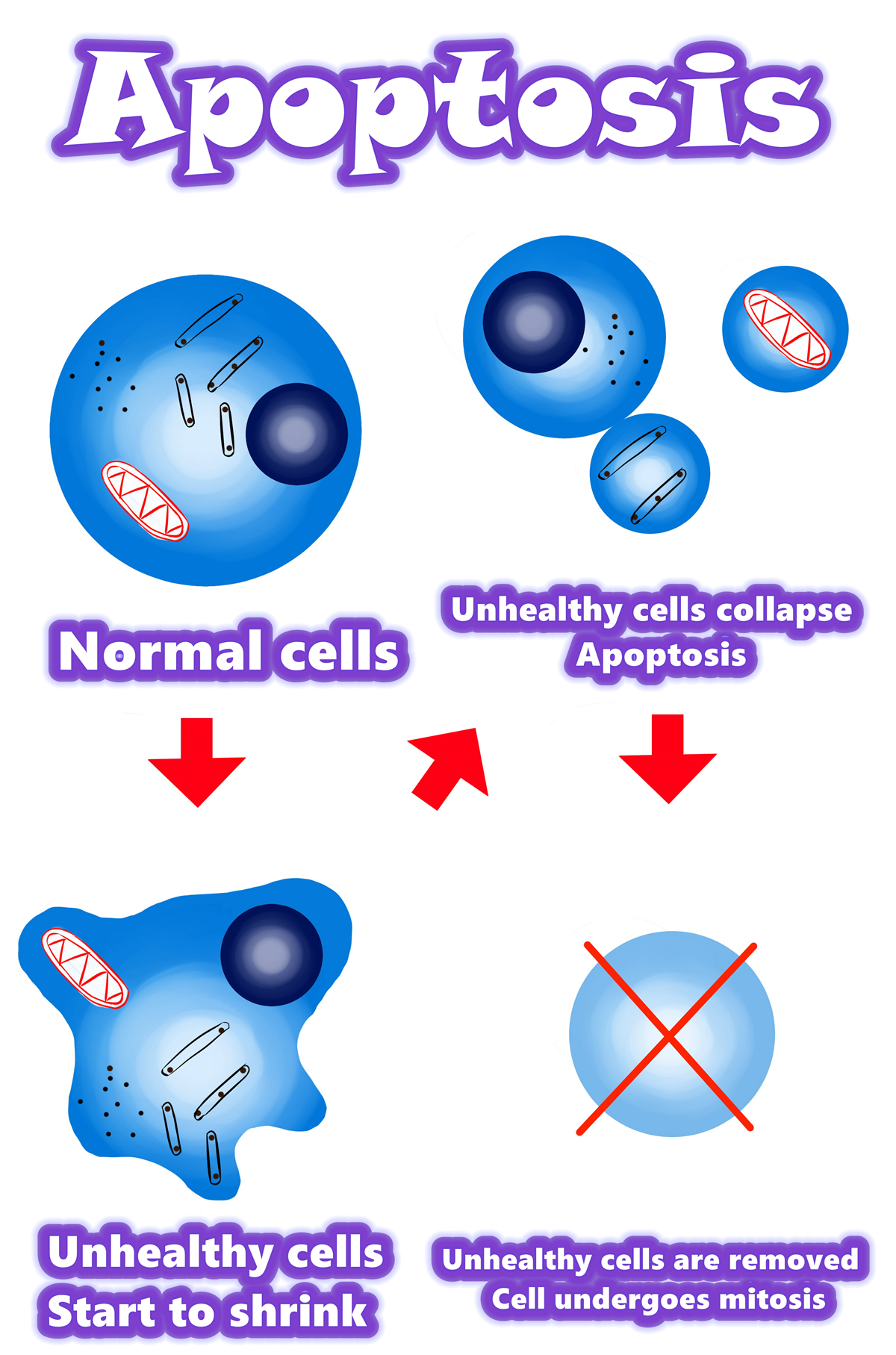
What is apoptosis ? | Abstract / Summary / Overview of Apoptosis
•Programmed cell death.
•Apoptosis is a form of programmed cell death, or “cellular suicide.”
•Apoptosis is a very orderly process during which the genome of the cell is broken down, the cell is fragmented into smaller pieces and the debris is consumed by nearby cells (phagocytes) that clean up the cell fragments.
•Apoptosis is different from necrosis, in which cells die due to injury.
•Apoptosis removes cells during development, eliminates potentially cancerous and virus-infected cells, and maintains balance in the body.
Why do cells undergo apoptosis?
•Apoptosis is a general and convenient way to remove cells that should no longer be part of the organism.
•Some cells are abnormal and could hurt the rest of the organism if they survive, such as cells with viral infections or DNA damage.
•Apoptosis is part of the development.
•In many organisms, programmed cell death is a normal part of development.
•Apoptosis is an autonomous process that involves the activation, expression, and regulation of a wide range of genes.
•Apoptosis is leading to programmed cell death to remove unwanted or abnormal cells in organisms and maintaining a stable internal environment.
The relationship between cancer cells and apoptosis
•Apoptosis can eliminate infected or cancerous cells.
•When a cell’s DNA is damaged, it will typically detect the damage and try to repair it.
•If the damage is beyond repair, the cell will normally send itself into apoptosis, ensuring that it will not pass on its damaged DNA.
•When cells have DNA damage but fail to undergo apoptosis, they may be on the road to cancer.
•However, “successful” cancer cells successfully evade the process of apoptosis.
•Clearly, there are many ways a cancer cell can avoid apoptosis.
•This allows them to divide out of control and accumulate mutations (changes in their DNA).
•Apoptosis is key to immune function.
•Apoptosis also plays an essential role in the development and maintenance of a healthy immune system.
•Apoptosis or programmed cell death plays a significant role in the growth regulation of normal and neoplastic tissues since it balances cell proliferation.
•Apoptosis usually occurs in a well-designed sequence of morphological events mediated by intrinsic and extrinsic pathways and has been demonstrated to activate the programmed cell death pathway to exert anticancer functions.
•Numerous antitumor drugs are known to trigger cell death by inducing apoptosis.
•Apoptosis is considered to be the major process responsible for cell death in various physiological events and has become a focus of interest in oncology.
•Most anticancer drugs have been shown to cause cancer cell death by inducing apoptosis.
Where are the weaknesses and symptoms of cancer cells?
The symptoms of cancer cells are in the nucleus.
The nucleus controls the outer cytoplasm, cell composition, cell viability, etc.
DNA mutations also mutate in the nucleus.
Therefore, to treat cancer cells, we must first enter the nucleus.
Let the “regulatory cell gene” mechanism enter the nucleus to regulate.
Cancer originates from genetic mutations.
Surgery, radiotherapy, and chemotherapy remain the three main traditional tumor therapy methods.
A major challenge in treating Cancer is the poor prognosis for advanced and recurrent cases.
Although chemotherapy is the main approach used to treat advanced and recurrent PC cases, its clinical performance is largely limited by various factors such as a relatively low response rate, drug resistance, and various adverse effects that substantially impact the quality of life (QOL) of Cancer patients.
However, it is difficult to achieve satisfactory outcomes by applying the traditional treatment methods, as surgery may result in trauma, and radiotherapy and chemotherapy may lead to severe side effects.
Although recent advances in the understanding of the biological characteristics of this illness and multidisciplinary therapeutic approaches, such as individuated chemotherapy, targeted therapies, immune approaches, and improved supportive care, the outcome remains dismal for patients with advanced disease.
One approach to overcome this problem is the development of new agents that can be used in combination with existing chemotherapeutics to yield better results than chemotherapeutics alone.
Therefore, searching for more effective alternative treatment strategies to strengthen the therapeutic efficacy with negligible side effects is urgently needed.
Accumulating evidence suggests that many natural products, including extracts and isolated chemicals, have the potential to interact with multiple targets in the signaling pathways that regulate cancer progression.
Natural phytochemicals derived from medicinal plants have gained significant recognition in the control of carcinogenesis and are considered as a novel approach in the prevention and treatment of cancer.
A large number of investigators have now reported that solamargine induces cell cycle arrest and apoptosis in a wide variety of cancer cells, such as basal cell carcinoma, squamous cell carcinoma, melanoma, colorectal cancer, bladder cancer, oral epidermoid carcinoma, myelogenous leukemia, prostate cancer, breast cancer, lung cancer, endometrial cancer, pancreatic cancer, gastric carcinoma, renal cancer, uterine cancer, mesothelioma, glioblastoma, osteosarcoma, Cancer.
Apoptosis or programmed cell death plays a significant role in the growth regulation of normal and neoplastic tissues since it balances cell proliferation.
Apoptosis usually occurs in a well-designed sequence of morphological events mediated by intrinsic and extrinsic pathways and has been demonstrated to activate the programmed cell death pathway to exert anticancer functions.
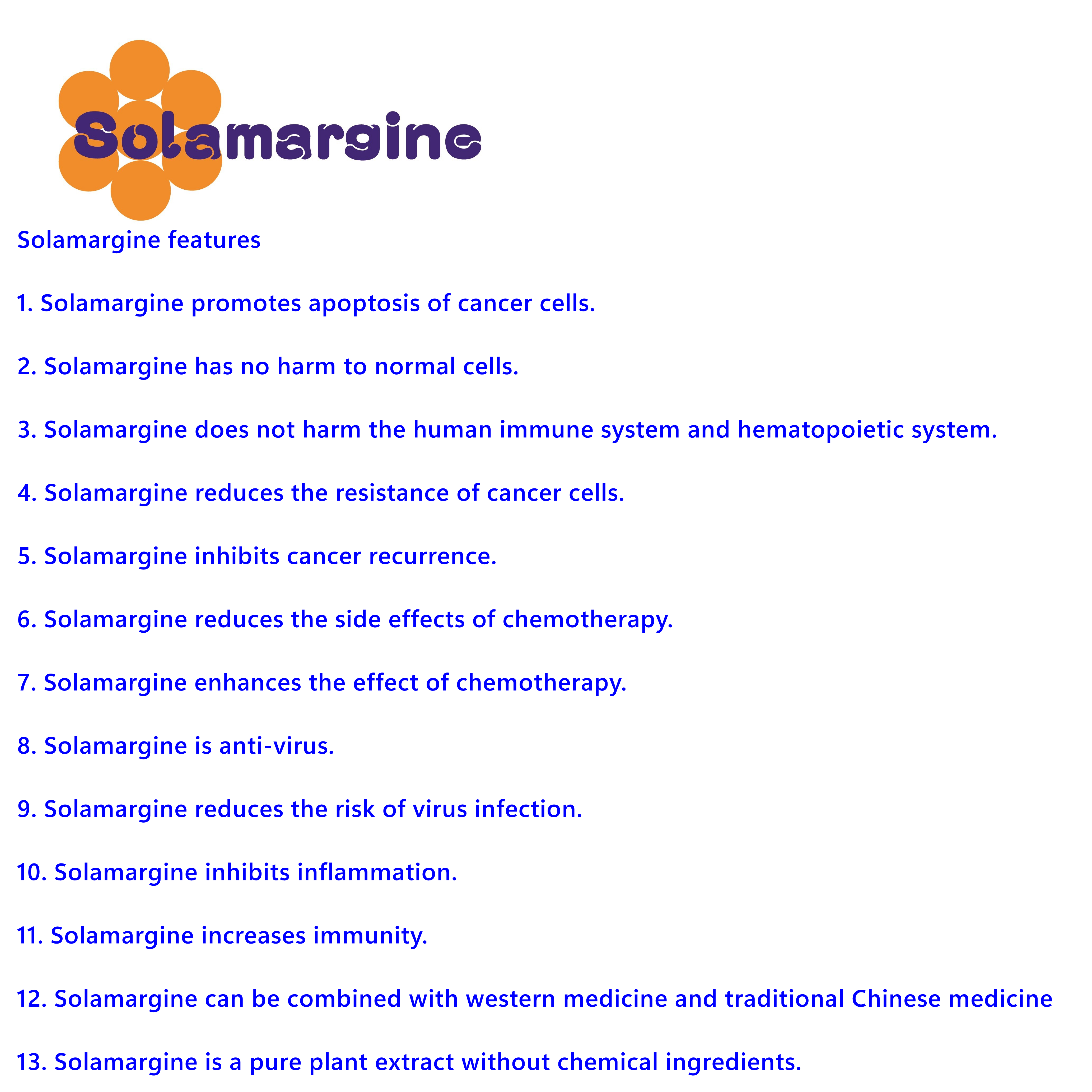
Solamargine features
1. Solamargine promotes apoptosis of cancer cells.
2. Solamargine has no harm to normal cells.
3. Solamargine does not harm the human immune system and hematopoietic system.
4. Solamargine reduces the resistance of cancer cells.
5. Solamargine inhibits cancer recurrence.
6. Solamargine reduces the side effects of chemotherapy.
7. Solamargine enhances the effect of chemotherapy.
8. Solamargine is anti-virus.
9. Solamargine reduces the risk of virus infection.
10. Solamargine inhibits inflammation.
11. Solamargine increases immunity.
12. Solamargine can be combined with western medicine and traditional Chinese medicine
13. Solamargine is a pure plant extract without chemical ingredients.
solamargine and Apoptosis
solamargine vs Warts (vulvar condyloma acuminatum, Genital warts)
solamargine vs Actinic Keratosis (Solar Keratoses / Actinic keratoses / AKs)
solamargine vs Squamous cell carcinoma (squamous cell cancer / SCC)
solamargine vs Cholangiocarcinoma
solamargine vs Lung cancer (SCLC / NSCLC)
solamargine vs Breast cancer
solamargine vs Ovarian cancer
solamargine vs Liver cancer (Hepatocellular Carcinoma, HCC, Hepatoma, Hepatoblastma)
solamargine vs Pancreatic cancer (PC)
solamargine vs Gastric cancer (GC / Stomach cancer)
solamargine Q&A (English)
Solution, improvement | Kidney Disease Q&A | Kidney cyst | Diabetes | Dialysis | Hyperglycemia symptoms | Proteinuria | Kidney disease
Cancer Medical Care | Side Effects of Chemotherapy | Improve Anemia | Improve Low Red Blood Cells | Improve Low Hemoglobin (Decrease/Decrease/Decrease/Insufficiency)
Cancer Medical Care | Chemotherapy by-products | Leukopenia | Neutropenia
Cancer Medical Care | Chemotherapy Side Effects| Improve Bleeding| Improve Platelet Decrease| Improve Platelet Deficiency| Improve Platelet Low| Improve Thrombocytopenia
Cancer Medical Care | Six indicators of physical health self-assessment: sleep, appetite, excretion, physical strength, mental strength, and psychology (emotion, mind)
Apoptotic (Correct/ Guide) bad behavior
How to Longevity?
Want to Change?
Life Above All | Release life is best for oneself (me / yourself)
Cure all diseases | Panacea | Package health
Eliminate misfortune!
Good affinities with others.
Beauty in Nature
other languages
Europe - беларуская мова (015)
Europe - Gaeilge na hÉireann (088)
General language - English (000)
Middle East - اَلْعَرَبِيَّةُ (042)
